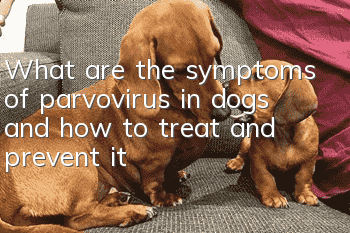What are the symptoms of parvovirus in dogs and how to treat and prevent it?

Although petting a dog is fun, dogs can be easily infected with disease viruses if they are not careful. Parvovirus is a very common disease among dogs. If it is not treated in time, it will lead to the death of the dog. Dog owners need to pay special attention!
Canine parvovirus, or canine parvovirus (CPV in English), is an infectious disease that is very lethal to puppies. There are many puppies that have not been vaccinated. The so-called intestinal tumescence that occurs when they are three months old is mostly because the dog is infected with canine parvovirus.
1. Symptoms of dog (canine) parvovirus
In the early stage of parvovirus, it is mainly accompanied by major symptoms such as vomiting and diarrhea, and usually vomiting first and then diarrhea. As long as the owner can observe carefully, he can still distinguish and judge. Later, he developed depression, anorexia, frequent vomiting and severe diarrhea. Smelly soy sauce-like or tomato juice-like bloody stools.
To put it simply, the symptoms of dogs suffering from canine (canine) parvovirus are very similar to acute gastroenteritis, including vomiting, diarrhea, and bloody stools. Although canine (canine) parvovirus can also attack the heart of dogs, gastrointestinal symptoms are more common. Therefore, when unvaccinated dogs, especially dogs under three months old, develop gastrointestinal diseases, special attention must be paid and go to the hospital for examination as soon as possible.
When you are not sure, you can also buy a product called small test paper.
2. Transmission routes of parvovirus
Parvovirus is a non-enveloped, isometric DNA virus. Dogs, especially puppies, are extremely susceptible to infection, mainly through direct and indirect contact, such as feces, urine, vomit and saliva of sick dogs, food and bedding contaminated by the virus, etc. can spread the virus.
Dog (canine) parvovirus is an infectious disease, so it usually has nothing to do with what the dog eats, but is related to the environment it comes into contact with. Sometimes dog owners wonder why their dogs are infected with canine parvovirus? This may be due to the long survival period of canine parvovirus, which can usually survive on contaminated things. last for five months or more, and are highly resistant to cleaning agents and most disinfectants. That is to say, dogs that have not been vaccinated may be infected if they come into contact with contaminated things. For a piece of grass, who knows what happened five months ago?
3. Why do puppies always turn their intestines?
Dog (canine) parvovirus can easily infect puppies under 12 weeks old, which is why three-month-old dogs in rural areas are prone to intestinal inversion. This is because canine (canine) parvovirus is a small DNA virus. It multiplies most rapidly in cells that are isolated at high speeds, such as puppy heart muscle cells and small intestinal epithelial cells. Therefore, it is usually not easy for adult dogs to get canine (canine) cancer.For small viruses, firstly, they are usually vaccinated, and secondly, this virus is not easy to multiply rapidly in the cells of adult dogs and is difficult to control.
4. Prevention of parvovirus
Pay attention to keeping your dog warm in winter. It is not advisable to take a bath immediately after a dog is sick, and the kennel must be thoroughly disinfected. To prevent parvovirus, a parvovirus inactivating vaccine can be injected once when the dog is 8 to 12 weeks old, and again 2 weeks later, and then once a year.
Currently, both the two-drug regimen for puppies and the five-drug regimen for adult dogs can effectively prevent canine (canine) parvovirus. As long as dogs are vaccinated on time as usual, dogs will theoretically be infected with canine (canine) parvovirus. There will be much less opportunity.
5. The treatment of canine parvovirus can mainly focus on two aspects:
1. Inject hyperimmune serum to increase antibodies.
Currently, monoclonal hyperimmune serum is the ideal serum, and the dosage must be as directed by the doctor. In addition, vitamin B complex can be supplemented according to the situation. For severe vomiting, 654-2 injection or metoclopramide intramuscular injection can be used.
2. When the dog's condition improves and starts to eat, he should eat small meals frequently and slowly increase the food intake. Do not suddenly eat too much and cause gastrointestinal discomfort, which will lead to diarrhea again; after feeding, the dog can be given Shimaosheng or multi-enzyme tablets , to help digestion; for dogs that have stopped having bloody stools but still have loose stools and can eat, antidiarrheal agents can be given to them.
6. Diagnosis and care of dog (canine) parvovirus
When a dog shows symptoms of acute gastroenteritis, such as vomiting, bloody stools, lack of energy, etc., if it has not been vaccinated, you should tell the doctor when seeking medical treatment. The dog should be tested for canine (canine) parvovirus. Nowadays, there are test strips that can be more accurate. Confirmed. Then treat the dog according to the doctor's instructions. When nursing, you should pay attention to the less irritation to the dog's gastrointestinal tract, the better. Fasting and water fasting are necessary, so during the treatment period, you may need to go to the hospital every day for drug injections and nutritional supplements, so you must be prepared for a long-lasting treatment. Preparation for battle.
Recommended Good Things
Aineng Pet Odor Eliminating Disinfectant can effectively remove body odor/feces odor and other odor molecules! Effectively treats skin diseases caused byfungi/bacteria! Can killparvovirus/canine distemper virus/coronavirusetc.!
It is edible grade for pets, does not contain fragrances, does not contain chemicals, can be sprayed directly, and is harmless to human pets!
Consultation:13028809308 (WeChat synchronization)
Scan the QR code on WeChat to enter the purchase
- What to look out for when buying a Corgi puppy
- What should I do if my dog is a servant? Learn these 3 steps to easily correct your dog’s bad habit of jumping on people.
- Ten myths about raising a dog, how many have you heard?
- Why do dogs bite their owners gently with their teeth?
- How to train Teddy to catch mice? Training Teddy to catch mice is an auxiliary training!
- How to train a lower dog to hunt? Essential skills for dogs!
- What should you pay attention to when cutting your dog’s nails?
- Is a dog crazy if it suddenly bites its owner? Or it treats you like a slave! How does the master regain his status as the boss?
- What should I do if my Eurasian dog eats too much and has diarrhea?
- Dogs are naturally active and are always prone to getting into trouble! The owner can learn how to deal with these common injuries.



